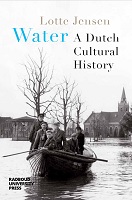Water
A Dutch Cultural History
Author(s)
Jensen, Lotte
Collection
Dutch Research Council (NWO)Language
EnglishAbstract
Floods are a fundamental part of Dutch history. Indeed, having ‘tamed’ the threats associated with living below sea level is part of Dutch national identity. In the cultural depictions of these devastating events, however, national pride at a certain collective resilience goes hand-in-hand with the collective trauma of exposed vulnerability. All too often, the Dutch were the losers in these battles against the elements. In a time of rising global sea levels, cultural scholar Lotte Jensen dives into the stories and images of the past to unpack this paradox for today.
Over the centuries, large parts of the Netherlands have been progressively reclaimed from its river delta home. Throughout that process, the country suffered countless floods, a number of which were truly catastrophic, such as the Saint Elizabeth’s Flood of 1421 or the North Sea Flood of 1953. Jensen describes how the Dutch have dealt with these disasters, in practice but also in the imagination. It is the story of babies in floating cradles, fatherly monarchs, community fundraisers, and the boy who stuck his finger in the dike. Centuries before the nation-building associated with the 1800s, the Dutch created a unifying ‘us’ – the image of the Dutch lion – against a ‘them’ – the ‘waterwolf’, the major threat which water embodied.
This national feeling and narrative were crafted with a set repertoire of images; role models (heroes and monarchs); charity (national and international solidarity); and a culture of remembrance. Jensen gives particular attention to the at times funny poems, books and songs, later criticized as clichéd or melodramatic, which these collective traumas inspired. She also demonstrates through monuments and works of art how this narrative has multiplied and acquired variations with time right up to the present. Though once cast in a more religious light – the flood as punishment for a general lack of religious devotion – the waterwolf has become, for example, a collective responsibility for the environment that begins with lifestyle choices.
Today the Netherlands lives with water more than it battles it, some thinkers even envisioning an ‘amphibian’ future for the country. The stories and images of the past, however, reveal that precisely vulnerability can be fertile ground for solidarity and togetherness. With rising sea levels representing a growing threat, this well-researched and highly readable cultural history shows how over time a culture’s imagination can gain new relevance beyond its borders. Acknowledging and building from a place of collective vulnerability might now be more important than ever.
Keywords
Sea level rise; Solidarity; Relief; Dutch history; Dutch culture; FloodsDOI
10.54195/ASQH4249ISBN
9789493296312Publisher
Radboud University PressPublisher website
https://radbouduniversitypress.nl/Publication date and place
Nijmegen, 2024Grantor
Classification
Dutch
Biography, Literature and Literary studies
Cognition and cognitive psychology
Cultural studies
Social impact of disasters / accidents (natural or man-made)
History


 Download
Download Web Shop
Web Shop